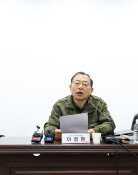National Assembly Advancement Act is nullified with DP’s forceful legislation
National Assembly Advancement Act is nullified with DP’s forceful legislation
Posted April. 28, 2022 07:47,
Updated April. 28, 2022 07:47
The Democratic Party of Korea forcefully passed the bill to deprive the prosecution of its function of investigation at the Legislation and Judiciary Committee of the National Assembly on Wednesday. While the People Power Party requested to set up an agenda coordination committee before a plenary meeting of the Legislation and Judiciary Committee, the Democratic Party included Min Hyung-bae who left the party and is now independent and passed the bill by four to two. In the plenary meeting that followed, the ruling party excluded the opposition party and single-handedly passed the bill with voting by rising. It took just eight minutes for the bill to be introduced and passed. As the Democratic Party said it would hold a regular session right afterward, the People Power Party said it would fight with a filibuster. An unsightly session of the National Assembly has repeated ahead of the inauguration of the new government.
The National Assembly Advancement Act was introduced in May 2012 in an agreement between the ruling and opposition parties to prevent the majority party’s forceful legislation by strengthening the roles of minor parties. The key aspects of the act are to form an agenda coordination committee to deliberate on the processing of contentious bills that are the concern of minor parties and allow filibusters by the members of minor parties. President Moon Jae-in who was then serving as the head of the opposition party also made a positive remark in September 2015 that the act intends to enable politics based on the agreement through conversation and compromise.
However, the Democratic Party’s handling of the bill to deprive the prosecution of its function of investigation completely nullified such an intention of the act. Min left the party in advance to be included as an independent member, which was needed to pass the bill at an agenda coordination committee of the Legislation and Judiciary Committee. Kim Jin-pyo, a senior member of the party, was privately appointed to the Legislation and Judiciary Committee without any relations to take advantage of the fact that the oldest member customarily becomes the head of an agenda coordination committee. Only the shell of the National Assembly Advancement Act, which was introduced to prevent one-sided forceful legislation, has been left. What was the point of its legislation?
The People Power Party is also partially responsible for the nullification of the National Assembly Advancement Act. The Saenuri Party, which was the predecessor of the People Power Party and the then ruling party, criticized the act as a shield for the opposition party. It also filed for adjudication on jurisdiction disputes to the Constitutional Court six years ago on the ground that the Chairman of the National Assembly violated the legislative power of National Assembly members by failing to process bills using the act as an excuse. The National Assembly Advancement Act has remained as the Constitutional Court dismissed the adjudication but it gave an excuse for the Democratic Party to use the act manipulatively.
Both the ruling and opposition parties must agree with the fundamental intent of the National Assembly Advancement Act. Therefore, the behavior of arbitrarily interpreting the act or abusing it based on the number of seats or political advantage or disadvantage should not be repeated. Such practice will not allow the advancement of political culture and sustain the politics of contention and conflict. The intent of the National Assembly Advancement Act, which is that contentious bills should go through sufficient deliberation and discussions, should be maintained.







